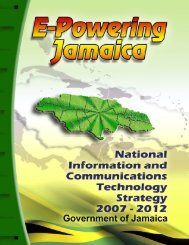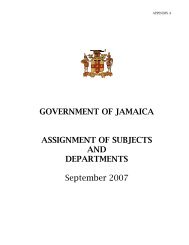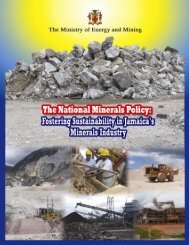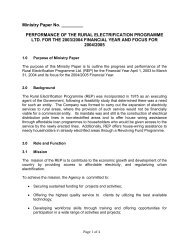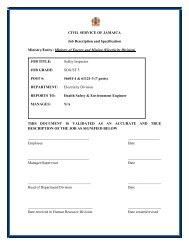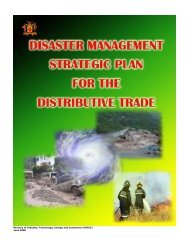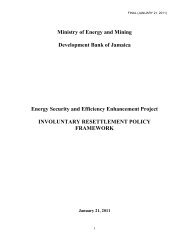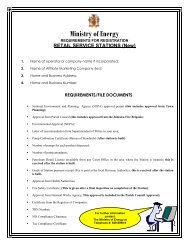Jamaica Biofuels Report - Ministry of Energy
Jamaica Biofuels Report - Ministry of Energy
Jamaica Biofuels Report - Ministry of Energy
You also want an ePaper? Increase the reach of your titles
YUMPU automatically turns print PDFs into web optimized ePapers that Google loves.
estates is completed. The large mill and estate owner <strong>of</strong> Bernard Lodge, Moneymusk andFrome, will likely provide education and awareness within its own organization directed totheir corporate planning objectives. However, it is possible that input from experts inbioethanol from sugar cane may be sought for guidance on, for example, extending the caneseason and maximizing electricity revenue. The owners <strong>of</strong> the remaining smaller mills mayneed outreach regarding the decision <strong>of</strong> whether to participate in the ethanol industry and,if so how, to optimize their returns. Opening a dialogue with all <strong>of</strong> the mill owners earlyduring the education and outreach campaign is desirable.Issues to address:(a) Options to produce ethanol along with granular sugar and molasses;(b) Options to become a year round supplier <strong>of</strong> electricity to the grid using energy cropsout <strong>of</strong> the cane harvesting season;(c) Options to extend the ethanol production beyond the cane harvesting season;(d) Opportunities to attract investment (e.g. which organizations are experienced withthis type <strong>of</strong> investment);(e) Bi<strong>of</strong>uel policy developments;(f) How bi<strong>of</strong>uels will affect business;(g) How to get information to make decisions about producing for ethanol;(h) Provision <strong>of</strong> feasibility studies for pilot plants;(i) How to maintain and improve yields (e.g., irrigation, fertigation, improved varieties,replanting, etc. – Occurs after research is done on the appropriateness <strong>of</strong> thesetechniques for the particular locations);(j) Varieties <strong>of</strong> sugar cane and sweet sorghum that mill owners may require underfuture scenarios;(k) Problems with cane burning and what alternative options exist;(l) Plant water requirements and best irrigation practices;(m) Fair labor practices and labor laws;(n) Sustainability (with emphasis on environmental impacts, labor and other socialissues, and issues associated with best management practices);(o) Pest and disease management strategies (including organic approaches);Benefits the sugarcane farmer will see from bi<strong>of</strong>uels.3. Sugarcane farmersThis category includes smallholders and large sugarcane farmers, as well as others involvedin growing sugarcane. Outreach for this group <strong>of</strong> stakeholders aims to improve sugarcaneyields, make growing it more efficient, and promote best practices (economic,environmental, and social – including labor laws and health and safety <strong>of</strong> workers).Trainings and information dissemination will build confidence in the expansion andlongevity <strong>of</strong> the ethanol and sugarcane industries in <strong>Jamaica</strong>.Issues to address:(a) How to maintain and improve yields (e.g., irrigation, fertigation, improvedvarieties, replanting, etc. – Occurs after research is done on the appropriateness<strong>of</strong> these techniques for the particular locations);57



